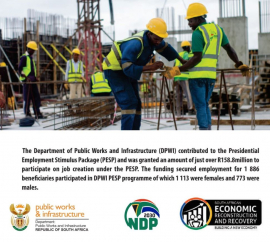
Young people who have a major role to play in building South Africa back better, must be provided with the skills and work experience so that they are better equipped for the job market, says Public Works and Infrastructure Minister, Patricia de Lille.
Highlighting the department’s contribution to the Presidential Employment Stimulus Package (PESP) employment programme, De Lille said the department was granted an amount of just over R158.8million to participate on job creation under the PESP. The funding was for 1 560 participants in the 2020/21 financial year effective from 1 November 2020 – 31 March 2021.
“A total number of 1 886 beneficiaries participated in the Department of Public Works and Infrastructure (DPWI) PESP programme of which 1 113 were females and 773 were males. The aim of the programme was also to equip beneficiaries with experience and skills to strengthen their employability opportunities.
“The recruitment of beneficiaries [aligned to the District Development Model] was decentralised to regional offices and the opportunities were advertised nationwide. The DPWI unemployed database skills for infrastructure was utilised to source additional beneficiaries where required,” De Lille said.
As part of the PESP, the department was able to employ graduates in various projects; this included the employment of graduates for the Welisizwe Rural Bridges Programme, as well as artisans and professionals in facilities management and waste management.
Other beneficiaries recruited by DPWI included engineers, town planners and architects.
“Many of these graduates were able to secure external employment since being part of the PESP. This has been one of the noted successes of the programme as these graduates could go into their private sector jobs with some experience from the PESP,” De Lille said in a statement on Thursday.
Some of the programme outcomes, as a result of the work of the PESP beneficiaries included:
- Water and Energy Efficiency Facilities Management work: energy and water audits were conducted at 15 facilities;
- Water and Sanitation Facilities: 17 water treatment plants operated and maintained;
- The Welisizwe Rural Bridges Programme: 350 sites identified for technical assessments and 400 desktop assessments conducted while 12 rural bridges were completed;
- Facilities Management: Conditions assessments were conducted on 113 state facilities and 53 technical maintenance tasks completed;
- Real Estate Management: 698 rates verification of client’s accounts and 177 immovable assets updated on the register;
- In house construction projects: eight feasibility studies conducted, three sketch plans developed, 56 site visits conducted; and
- Public Private Collaborations: 35 water treatment plants operated and maintained.
Under the work conducted by beneficiaries, some of the skills required for the work they conducted included technical report writing, plant operation, energy and water analysis verification skills, site investigation, desktop studies, research and investigation, knowledge of high-level condition assessment, client management skills, technical advisory skills, civil, electrical and mechanical maintenance, and data collection and analysis.
Over 70 beneficiaries absorbed into labour market
De Lille also highlighted that during this period, 78 beneficiaries were absorbed into the labour market, and the department’s Professional Services branch is currently expanding the existing Skills Pipeline Strategy to absorb more graduates into the department through this strategy.
“The beneficiaries were also advised to register on the DPWI unemployed database so that they can be linked to available opportunities. The department also trained graduates on the importance of Professional Registration in the Built Environment.
“Graduates registered as candidates with professional bodies to pursue professional registration in order to strengthen their chances to participate in mentorship opportunities as and when they become available.
“The Presidential Employment Stimulus Programme has encouraged real innovation in how we deliver public employment programmes across government, from how we recruit participants, to the type of work that is supported. We must continue to take valuable lessons from this programme and expand it to continue creating much needed jobs for our people including highly skilled jobs,” said the Minister.
Earlier this week, President Cyril Ramaphosa announced that the PESP employment programme had reached the 1 million mark since its inception in late 2020. The stimulus forms part of the Economic Reconstruction and Recovery Plan (ERRP), which set out a range of measures to address the economic impact of the COVID-19 pandemic.
The aim of the Presidential Employment Stimulus is to utilise public funding to create jobs and support livelihoods while the labour market recovers.
The opportunities supported by the PES are in addition to those created through the Expanded Public Works Programme and other existing programmes. – SAnews.gov.za


